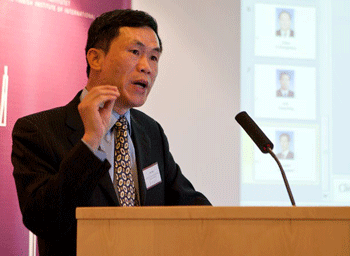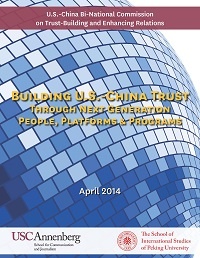|

Dear Zhenying & All:
Please join us for a talk with Professor Ren Xiao from Fudan University to examine ways in which the academic and policy research community can impact China's foreign policies.

9/4/2014 - Academic Input and China's Foreign Policy Making
Annenberg School of Communications and Journalism, ASC 207
University of Southern California
Los Angeles, CA 90007
Time:4:00 - 5:30PM
Cost:Free, please RSVP at uschina@usc.edu.
Foreign policy making in China is becoming increasingly complex. As China is faced with new domestic and international challenges, more and more actors have become involved in the process, and China's international relations specialists are playing a larger role than before by providing more input. There are different ways for the academic and policy research community to have impact. These include providing policy briefs, advisory meetings, personnel exchange(a two-way street:Foreign Ministry officials serving as diplomats-in-residence at the academic institutions and academics serving at the Chinese embassies in the key capital cities), targeted research projects, and individual contact. People's Congresses and the Consultative Conferences are also channels for the academics to make themselves heard. Nowadays the "revolving door" arrangements are basically seen as a positive development in China, and more practices in this line are encouraged. It is a changing system with "Chinese characteristics."
About the speaker:
Ren Xiao 任晓 received his Ph.D. in political science from Fudan University in 1992 and is now a professor, teaching international politics at the Institute of International Studies(IIS). He also serves as director of the IIS Center for the Study of Chinese Foreign Policy.
His research concentrates on theories of international politics, Asia-Pacific affairs, Northeast Asian security, and Chinese foreign policy. His recent publications include New Frontiers of China's Foreign Relations and U.S.-China-Japan Triangular Relationship.
Prof. Ren serves on several editorial boards, including Globalizations, Journal of Global Policy and Governance, East Asia:An International Quarterly, and East Asian Policy. He is a member of the China National Committee of Council for Security Cooperation in the Asia Pacific(CSCAP)and worked at the Chinese Embassy in Tokyo in 2010 and 2011.
Driving Directions to Campus
For maps and directions to campus, visit the University Park Campus Map & Driving Directions page.
Suggested Parking($10 on campus):
Parking Structure X(PSX)
Enter at the Figueroa Street Entrance at 35th Street(Entrance 3)
Parking Structure D(PSD)
Enter at Jefferson Blvd. and McClintock Avenue(Entrance 5).

USCI introduces a new website - US-China Exchange
US-China Exchange offers a unique database of past and present exchange programs and is the go-to reference for all those interested in U.S.-China affairs and, especially, for those eager to link up with standard-bearers in U.S.-China exchanges and to learn from the best practices of others.

The website is a result of the commission on trust-building between the United States and China led by Ernest J. Wilson III, dean of the University of Southern California Annenberg School for Communication and Journalism, and Wang Jisi, then dean of the Peking University School for International Studies. Since 2012, the distinguished bi-national commission consisting of scholars, former officials, and businesspeople, has investigated how to best improve U.S.-China understanding. Such understanding is essential if we are to reduce our differences and work together to address pressing problems.
The U.S.-China Bi-National Commission on Trust-Building and Enhancing Relations released its report on fostering deeper U.S.-China understanding and improved ties through next generation programs, bringing in a greater variety of people and utilizing new technological platforms.
Click here for more information and to watch the report launch presentations.
USC U.S.-China Institute | 3502 Watt Way, ASC G24 | Los Angeles | CA | 90089
Tel:213-821-4382 | Fax:213-821-2382 | uschina@usc.edu | china.usc.edu

| 
















